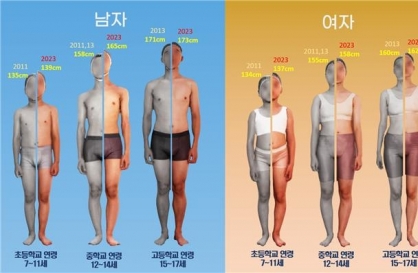The Korea Herald is publishing a series of interviews on promising startups in the fintech industry. This is the first installment. -- Ed.
While cryptocurrency exchanges among those in their 40s and 50s deal with larger volumes, the older generation more often than not face inconveniences in trading their digital currencies.
“Some traders often found themselves in trouble,” Kevin Cha, founder and chief executive of digital currency exchange Coinone, told The Korea Herald in an interview. The interview was held at Coinone Blocks, the first offline location for cryptocurrency trading in Seoul set up by Cha. “(Until now) everything about cryptocurrency trade had been made online.”
Coinone Blocks features “advisers” at a counter, two 85-inch screens aligned with one another to show real-time coin price charts and a hard wallet shop selling private keys for cryptocurrency stored on a flash drive.
The space, located in Yeouido, Seoul, also has an automatic teller machine that converts cryptocurrency into the Korean won, though the service is unavailable for now.
“Some even visited the Coinone headquarters before (the opening of the offline branch),” Cha said, referring to the headquarters located on the 19th floor of Three International Finance Center Seoul. “Now, Coinone is ready to help customers not used to online trades.”
The Coinone Blocks offline branch handled an average of 70 visitors a day in its first week after opening on Sept. 11, according to Cha.
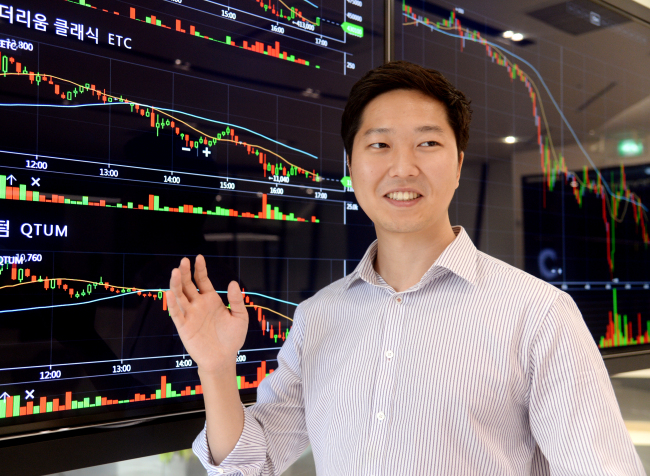 |
Kevin Cha, founder and chief executive of digital currency exchange Coinone, speaks during an interview with The Korea Herald in Seoul. (Park Hyun-koo/The Korea Herald) |
The 28-year-old hacker-turned-entrepreneur appeared unperturbed by major digital currency exchanges’ shutdown in China, and the following downdraft in the bitcoin price in Korea.
Shanghai-based BTC China announced Thursday that it would suspend trades of digital currencies starting on Sept. 30. The other two major exchanges -- OKCoin and Huobi -- followed suit.
The news added downward pressure on bitcoin prices in Korea, initially triggered by rumors of the China shutdown earlier in the week. On Thursday, bitcoin plummeted 23.5 percent from 4,470,000 won ($3,960) at 9 a.m. at Coinone, but it recovered to 4,464,500 won in Tuesday’s opening.
“China won’t be able to go about-face alone, against the global markets’ vision to change the future,” Cha said. “Markets will soon pick up the pieces from the damage done.”
Founded in 2014, Coinone is now Korea’s third-largest cryptocurrency exchange where users are able to trade bitcoin, bitcoin classic, ethereum, ethereum classic, ripple and quantum.
Despite being a late mover in bitcoin trade, Coinone’s edge in security features, along with its pioneering decision to list ethereum, ripple and quantum for the first time in Korea, gave it the status of a major digital currency exchange in Korea.
Coinone’s cybersecurity team comprises of hackers from offensive security researcher group Grayhash. When hackers mock-attack the website or database online, Coinone “spots slacks in cyber protection” and “tests new security function by mock-hacking,” said Cha.
Security issues in cryptocurrency trade began to come to the fore in Korea, as the nation’s largest exchange in trade volume Bithumb suffered a leak in information of some 30,000 traders in July.
Three years ago, Tokyo-based exchange Mr. Gox’s bankruptcy motivated Cha to jump into the digital currency market, as it was a hacker attack that led to $460 million worth of bitcoin going missing.
As a computer science student at Postech, Cha took third place in 2009 at Def Con Capture the Flag, an annual hacking conference held in Las Vegas, as a team member of Plus.
Cha’s hacking prowess built for nearly a decade helped him “sketch out a security system” for the Coinone platform and “judge who has the better knowledge in cybersecurity,” he said.
In addition to such cyber protection measures, Coinone in August became the first cryptocurrency exchange in Korea to have its damage covered by a local insurance firm.
However, widespread perceptions that trading cryptocurrency is “not safe,” in part due to a legal vacuum in Korea, have overshadowed the layers of Coinone’s protection system, he said, adding that the market grew over 20 times in the first half this year.
“The introduction of a legal framework surrounding cryptocurrency will bring in the shift in perceptions that bitcoin trades are not safe and illegal,” Cha said, referring to a bill to grant legal status to digital currencies in motion at Korea’s National Assembly since July.
(
consnow@heraldcorp.com)

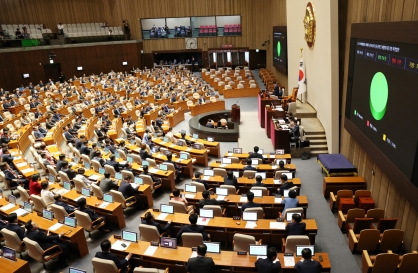

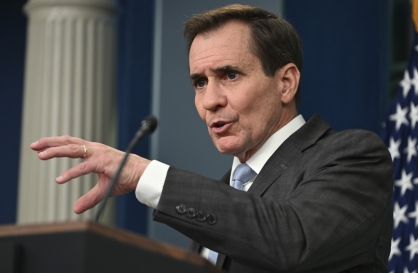
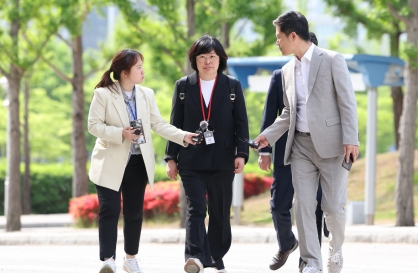

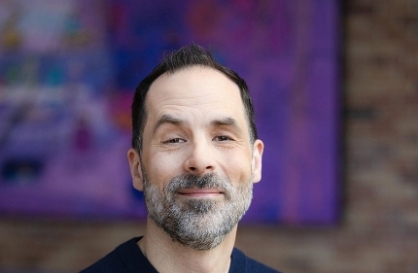
![[Graphic News] Number of coffee franchises in S. Korea rises 13%](http://res.heraldm.com/phpwas/restmb_idxmake.php?idx=644&simg=/content/image/2024/05/02/20240502050817_0.gif)
